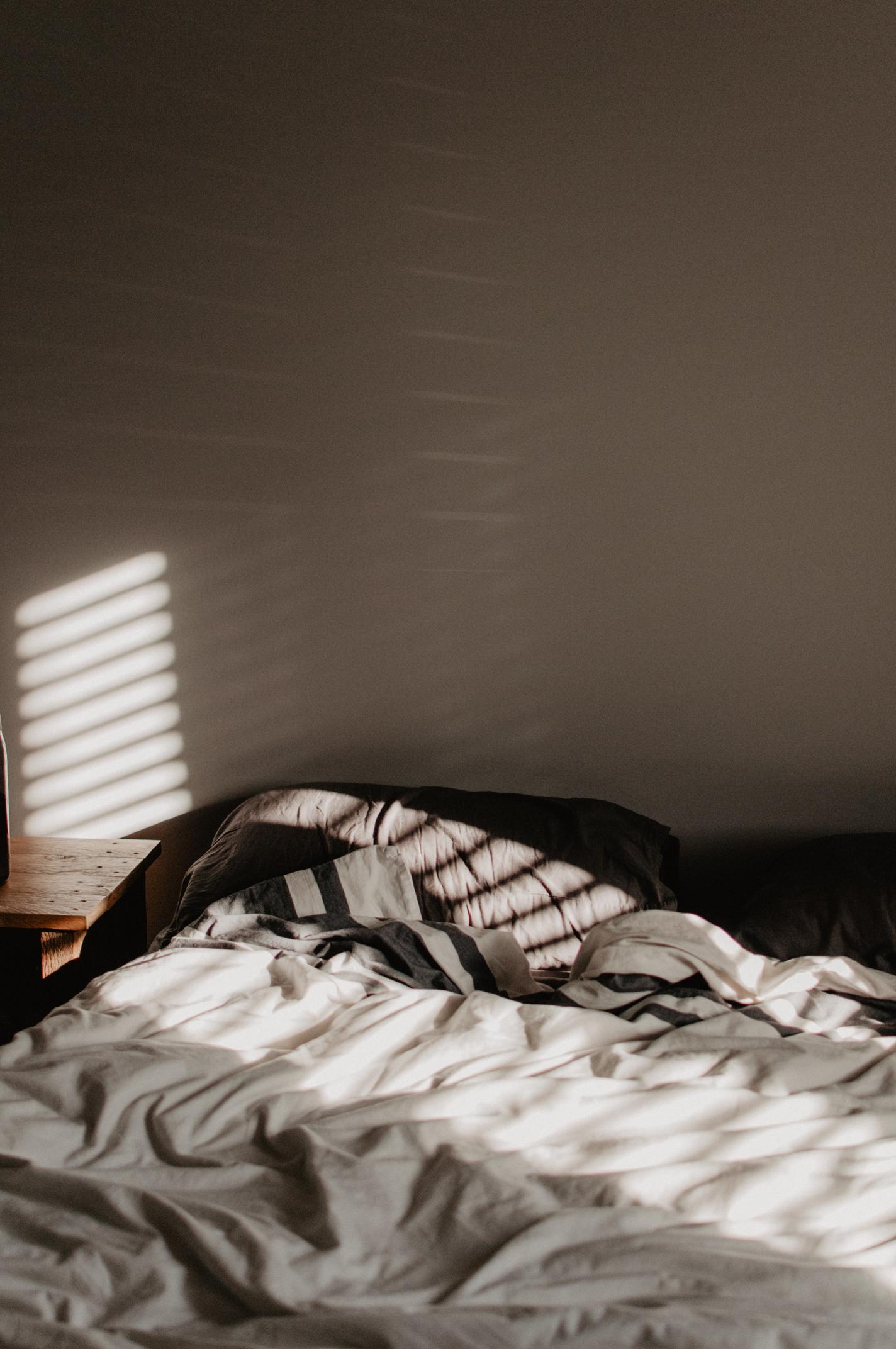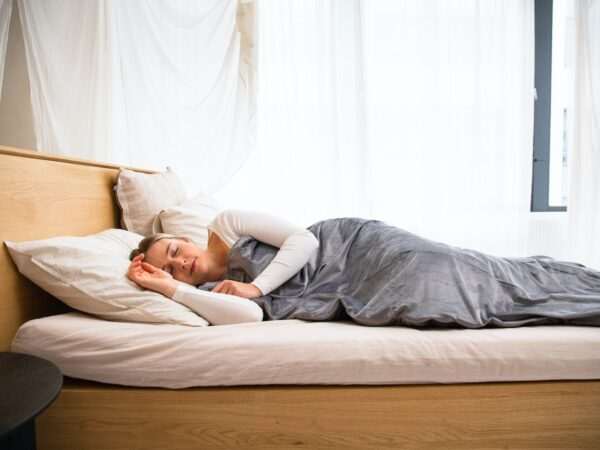Summary. Are you struggling to get enough restful sleep each night? Do you feel exhausted throughout the day? If so, then you’re not alone. According to the Centers for Disease Control and Prevention, up to 70 million Americans report poor sleep quality.
Sleep affects our life, work and overall well-being. Every day we wake up either fully rested and refreshed or exhausted and sleep-deprived. If you’re one of the many people currently asking yourself “How can I improve my poor sleep quality?”, then today is the right day to start. It all starts with understanding what factors are keeping you from a good night’s sleep. Are electronics and screen time making it hard to get to bed on time?
What Is Poor Sleep Quality?
The most important factor in improving poor sleep quality is to establish a regular sleep routine. Going to bed and waking up at the same time each day helps to regulate the body’s internal clock, making it easier to fall asleep and wake up each day. Avoiding caffeine in the evening and having an early dinner can also help avoid disturbances during the night. Creating an environment conducive to sleep is also important.
It is also helpful to limit screen time an hour before bed, and to avoid stressful activities that can impair sleep or result in overall anxiety.
Causes of Poor Sleep Quality
Establishing a sleeping pattern has many benefits. This makes it easier for you to fall asleep and get the most out of your sleep. It helps to create an environment that is conducive to sleep. Make sure the temperature in your bedroom is comfortable, and the darkness and lighting are as soothing as possible. It also helps to stay away from screens before bed, as the blue light from smartphones and laptops can make it difficult to fall asleep. Additionally, try to avoid caffeine and other stimulants in the late afternoon and evening as these can interfere with sleep quality.
Regular exercise and relaxation techniques such as deep breathing, yoga, and meditation can all be great tools for managing stress. Additionally, establishing a nighttime ritual such as journaling, reading or taking a warm bath can help you to relax and prepare for rest. Finally, if you’ve been consistently having trouble sleeping, don’t be afraid to speak to your doctor. They may be able to prescribe medications that can help reduce the effects of sleep problems. Or, your doctor may be able to refer you to a specialist that can help you to identify and address the underlying causes of your poor sleep quality.
Lack of Daily Exercise
One of the main contributing factors to poor sleep quality is lack of daily exercise. Exercise helps relax and stimulate our bodies, as well as release endorphins which contribute to a restful sleep. Fortunately, incorporating daily exercise into our lives can help improve our sleep quality.
Studies have found that small, consistent amounts of activity help improve overall sleep quality more than more vigorous amounts of activity that are done occasionally. Going for a thirty-minute walk every day is a great way to start. Or, if weather or recent events make that impossible, try exercising indoors – start with simple activities like yoga or stretching at least three days a week. Another great way to get exercise during this time is to take part in online classes or activities, or even use apps that offer simple tips and ideas for exercises you can do at home. Incorporating daily exercise into our lifestyles can also help improve mental health and wellbeing.
Exercise releases endorphins, which are naturally-occuring neurotransmitters that create feelings of joy and satisfaction. Regular physical activity can also help lower anxiety, depression, and stress levels, which in turn can improve our overall sleeping pattern.
Unhealthy Eating Habits

Foods that are high in sugar, fats, and processed ingredients can cause you to feel sluggish and sluggishness can lead to sleepless nights. To improve your sleep quality, it is important to make changes to your diet and lifestyle to ensure that your body has everything it needs to get the restful sleep it deserves. Start by looking at your daily diet and identify items that could be harmful to your sleep.
Additionally, processed foods and those with added chemicals can contribute to poor sleep. In order to improve your sleep quality, it is important to replace these unhealthy items with healthy alternatives. Eating a balanced diet that is high in protein, fruits, vegetables, and healthy fats can help improve your sleep. Additionally, reducing your daily caffeine intake can help reduce any potential disruption to your sleep quality. It is also important to make healthy lifestyle changes in order to improve your sleep quality.
Additionally, establishing a bedtime routine and removing technological items from the bedroom can also be helpful in improving your sleep quality. Creating a space conducive to a restful night’s sleep is essential for those seeking to improve the quality of their sleep and overall health. In conclusion, eating healthy and making the necessary lifestyle changes can be very helpful in improve your sleep quality. Focusing on nutrient-dense brain foods as well as developing healthy habits like regular exercise and a consistent sleep schedule can make a significant difference in improving your sleep quality.
Disruptive Sound or Light

For example, incorporating a light or white noise machine into your bedroom can be highly beneficial. Set these devices up to start playing a low-volume sound for a few minutes before you plan to go to sleep.
This bedtime sound can help your body to transition into a sleep state, easing you into a calm, relaxed sleep with more regular sleep cycles. Another way to use disruptive light or sound to improve sleep is to adjust exposure to natural light. If you frequently find yourself having trouble getting to sleep or having a restless sleep, consider adjusting the color and brightness of the curtains or blinds in your bedroom. Opt for darker, more opaque curtains, and avoid screens or LED lights in the bedroom, as these can cause an excess of melatonin production in your body. This melatonin release can make it difficult for you to fall asleep or stay asleep.
Smart lights and sound machines are becoming more common in the bedroom, and these devices lend themselves to improving sleep quality without the need to adjust your lifestyle. Smart devices can help you adjust light and sound levels to the perfect sleep environment for you, as well as providing additional features like sleep tracking or personalized night time music.
Overstimulation Before Bedtime

If you’re struggling to get a decent eight hours of sleep, the following tips may help to improve your poor sleep quality. Firstly, switch off the devices and screens an hour before bed. Even if you’re not consciously paying attention to the content, the light and sound that comes from screens can still affect your ability to doze off. Instead, read a book or listen to some soothing music.
Next, de-clutter the bedroom. Although it may sound counterintuitive, we become more alert when our environment is cluttered. Mess and noise can have a very strong effect on our subconscious, and make it difficult for us to rest. Clear the room of distractions, eliminate any clutter, and put away any gadgets before resting. Thirdly, have a hot bath. There’s nothing quite like a hot soak or shower to help you relax after a busy day. Try aromatherapy oils to release stress and improve your sleep.
Stress & Anxiety
One of the most effective ways to improve your sleep quality is to create a night-time routine and stick to it. This means going to bed and waking up at the same time every day.
Try to avoid electronics like phones and computers close to bedtime as they can overstimulate the body and are linked to poorer sleep quality. Creating a relaxing environment to sleep in is also important. This means reducing noise, light, and clutter in your bedroom.
If noise and light are a problem, consider earplugs and blackout curtains which can help keep them out. Additionally, keeping your room temperature on the cooler side helps your body to relax and prepare for sleep. Try to do relaxing activities for an hour or two before bed.
This helps to calm the mind and body and prepares them for sleep. Finally, remember to practice relaxation techniques when you get in bed. Concentrate on your breathing and allow the rest of your body to relax. T
Symptoms of Poor Sleep Quality

Common symptoms of poor sleep quality include: difficulty falling asleep, staying asleep, and waking up too early in the morning; feeling exhausted during the day; being easily irritable and unable to concentrate; and having difficulty remembering recent events or tasks.
But there are ways to improve your sleep quality. It’s important to make sure your sleeping environment is relaxing and comfortable, with no noise or light distractions. If possible, sleep on a comfortable mattress to ensure your body is fully supported. Taking breaks during the day can also help your body to rest more deeply when you head to bed at night.
Difficulty Falling Asleep

Creating a bedtime routine can help your body recognize when it is time to go to sleep each night. This may include taking a warm bath or shower, reading a book or doing a simple stretching routine. Avoiding screenings one to two hours before going to bed also helps to keep your body in tune with its natural responses, as bright lights and stimulating activities can reduce our ability to fall asleep.
Creating a sleep environment conducive to a good night’s rest is key. Make sure your bedroom is dark and at a comfortable temperature, so that your body can settle into sleep mode. If loud noises are a problem, use a fan or sound machine to create white noise to mask outside noises.
Bedroom clutter can also lead to sleep disturbances, so try to keep the space clean and use furniture designed for comfort. Establishing a consistent sleep schedule is also important. Going to bed and getting up at roughly the same time every day can help to regulate your body clock and improve sleep quality.
Waking Up Multiple Times During the Night
In the long-term, it can lead to chronic health problems if left untreated. To improve your sleep quality, you should consider a few simple steps that can help you to create an environment conducive to quality rest. First, your bedroom should be an oasis of peace and calm.
Consider ditching electronics—tablets and computers—and replace them with a book or magazine if you need some extra stimulation before bed. The blue light from electronics can also cause disruption to the body’s natural sleep-wake cycle.
Second, establish a relaxing nighttime routine, such as taking a bath, doing gentle stretches, or reading. Make sure you finish this routine at least an hour before bedtime to give your body time to unwind. It helps to train your body to expect sleep at the same time every night.
Waking Too Early or Experiencing Geater Grogginess
The first step to improving our sleep quality is to ensure that we are going to bed at a reasonable time.
Additionally, it’s important that we keep a consistent sleep schedule and try to wake up at the same time each day. This helps condition our bodies to sleep better. We can also optimize our environment for sleep. Doing things like removing electronics from the bedroom, sleeping with a less-than-65-degree Celsius temperature, and using blackout curtains can help create a good environment for sleeping.
Tips to Improve Poor Sleep Quality

Poor sleep can lead to a weakened immune system, depression, mood swings, fatigue, and more. But the good news is that there are several easy-to-implement tips you can use to help improve your sleep quality and finally get a good night’s rest. One of the most important tips to improve your sleep is to set a consistent sleep schedule. This means going to bed and waking up at the same time every day. It is best when you stick to a 7-8 hour sleep schedule. Turning off any electronics an hour before your bedtime is also important.
Creating a comfortable environment for yourself in your bedroom is another recommendation. Make sure that your bedroom is cool, dark, and quiet. If needed, invest in blackout curtains and a fan or air purifier to create a calm and peaceful atmosphere. If you are feeling anxious or overwhelmed, try calming activities before bed like yoga, reading, stretching, or journaling. This will help clear your mind and signal to your body that it’s time to sleep.
On the other hand, if you are still having trouble falling asleep, it may be helpful to try natural sleep aids such as melatonin, valerian root, or magnesium. Eating healthy and exercising regularly during the day will also help improve your sleep quality. Exercising at least 20 minutes a day will also help tire you out enough to have a good night’s sleep. Finally, avoid consuming caffeine, nicotine, or alcohol before bed.
Optimize Your Sleep Schedule

Here are simple tips to help you optimize your sleep schedule and improve your sleep quality:
Set a bedtime routine and stick to it. Create a pre-bedtime routine that you stick to every night. This should involve relaxing activities like reading, taking a warm bath, or taking some time to meditate and clear your mind. This routine will help your body and mind prepare for sleep while giving your body the chance to wind down and relax.
Keep your bedroom dark. Light can interfere with your ability to fall asleep, so make sure you’re sleeping in a room that’s as dark as possible. Use blackout curtains or an eye mask if necessary. Avoid caffeine and alcohol. Caffeine and alcohol can both interfere with your sleep, so try to cut back on them as much as possible. Caffeine can remain in your system for up to 8 hours, so it’s best to avoid it in the late afternoon and evening. It’s also important to avoid alcohol close to bed time as it can cause restless sleep.
Choose bedding and pillows that are comfortable and supportive. You should also keep the temperature of your bedroom between roughly 65-73 degrees F. Exercise during the day. Regular physical activity can help you sleep better at night. Try to get at least 30 minutes of moderate exercise, such as walking or cycling, each day. Exercise will help you feel more relaxed and get better quality sleep.
Develop a Bedtime Routine

Going to bed and waking up at the same time each day is essential for regulating your body’s natural clock, so try to stick to it as much as possible. Next, find a quiet and comfortable place to sleep. Get rid of any distractions like lights and noises.
Unplug from electronics and switch off any notifications. Create a soothing atmosphere with calming music, a dim nightlight, and minimal humidity or temperatures to make the bedroom sleep friendly. Try to get into a relaxing routine before your designated bedtime. Taking a warm bath or shower can promote relaxation and reduce your body temperature slightly, making you feel drowsy. Reading a book or doing light yoga can help shift your focus away from the day’s stressors and into something calmer.
If you snack before bed, opt for something light and healthy, like an apple and peanut butter or some Greek yogurt. Avoid caffeine late in the day, as this can keep your body awake, and stick to water as your drink of choice.
Create a Comfortable Bedroom

Begin by assessing the temperature, ventilation, and noise levels in your bedroom. Invest in a good air conditioner and fan, as well as blackout curtains or shades to block out unwanted light. Check that all doors and windows close tightly, so that no drafts can sneak into your bedroom and cool you down during the night.
When it comes to the bedroom furniture, good sleep hygiene is important. Aim for a comfortable mattress that’s suited to your needs, and make sure it’s comfortable for both you and your partner, if applicable. Pillows are important too—choose thick, firm pillows that support your head and neck.
Find a bed frame that’s low to the ground so as to not restrict the flow of air, and invest in an ergonomically designed chair or lounge chair if you like to sit and work in bed. As for the décor, try to keep it minimal. Introduce calming colors that resonate with you – perhaps pastel blues or greens, or neutral hues like beiges and taupes. Again, keep these items to a minimum to avoid clutter.
Reduce Caffeine & Alcohol Intake

Caffeine can stay in your system for up to 10 hours, so if you are drinking coffee even late in the afternoon, you may be sabotaging your sleep. The same goes for alcohol; although it can make you sleepy initially, it can disrupt your sleep as the night goes on. By cutting back on both of these substances, you can improve your sleep quality significantly.
If you are a regular coffee drinker, try to limit yourself to one cup per day. This can take a bit of planning in advance and can require you to make different choices when you encounter tempting coffee shops or bars throughout the day. You can substitute healthier options such as herbal tea or water and use them to help you beat your cravings for coffee or alcohol. If you love to enjoy a glass of wine or a cold beer, try to limit yourself to one drink per day.
Even if you’ve had just one drink, its effects may still linger for several hours, leading to disrupted sleep. Again, substituting something like sparkling water with a splash of juice can help you control your cravings and enjoy a healthier drink.
Over The Counter Products for Sleep

Before trying any sleep aids, it is important to identify the root cause of the sleep issues in order to ensure that the treatment will be successful. Common causes of poor sleep quality include stress, anxiety, depression, poor diet, and lack of physical activity. Identifying the cause of sleeplessness is an important first step in finding the right remedy.
It is important to choose an appropriate sleeping aid based on individual needs. For people with occasional difficulty falling or staying asleep, it may be beneficial to start with an herbal supplement such as melatonin. This natural hormone is widely available in tablet form and often helps people to fall asleep more quickly. Additionally, valerian root is an herbal supplement that can be taken to help promote relaxation before bedtime and improve the overall quality of sleep. For those with more severe issues related to poor sleep quality, stronger over the counter sleep aids such as sedatives or tranquilizers may be needed. These drugs act faster than herbal supplements and can last between 6-8 hours.
Time to See a Doctor
Have you been struggling with insomnia and feel like your quality of life is starting to suffer as a result? If this is the case, then it might be time to see a doctor about your sleep troubles. Poor sleep quality can wreak havoc on your physical and mental health.
To ensure that you can remain healthy and productive, it’s important to diagnose and address the source of your sleep troubles. So, how exactly can you improve your poor sleep quality? First, a doctor can help you pinpoint any underlying medical issues that may be causing your lack of restorative sleep. From there, treatment options may range from lifestyle changes, such as adjusting your bedtime routine to allow more “winding down” time before sleep, to prescribed medications. Depending on the type of issue, you might also be able to get relief through cognitive behavioral therapy or relaxation techniques.
This might include exercising regularly, sticking to a consistent sleep schedule, avoiding caffeine and alcohol, and using your bedroom only for sleep and sex. Additionally, your bed and bedroom should be comfortable and free from distractions like TVs or bright lights. If you’ve been unable to get a good night’s rest for an extended period of time, then it’s definitely worth seeing a doctor about it. With the right combination of treatments and lifestyle changes, you can finally start getting the restorative sleep you need.
Final Touch
Do you want to improve your poor sleep quality? Quality sleep is essential for physical and mental health, but many of us don’t get the sleep we need each night. Poor sleep quality isn’t just uncomfortable and inconvenient- it can lead to long term health consequences. Improving your sleep quality can be accomplished in a variety of ways. Making small changes to your sleeping environment and routine can make a big difference. Start by investing in a comfortable mattress and bedding, as well as blackout curtains if necessary.
If your sleep quality continues to be poor, speak to your doctor about possible solutions. Exercising daily enhances the quality of your sleep. Not only does exercise give you a better night’s sleep, but it also provides multiple physical and mental benefits. Incorporating physical activity into your daily routine has been shown to improve the quality of your sleep over time. Finally, building healthy sleep habits is essential for improving your sleep quality.
Avoiding caffeine late in the day, and drinking a calming cup of herbal tea before bedtime can also help. If you’re looking to improve your poor sleep quality, there are many steps you can take. Invest in a comfortable mattress and bedding, avoid screens before bed, exercise daily, and stick to a regular sleep schedule. With patience and consistency, you’ll be sleeping better in no time! Have you found any strategies that have worked for you in improving your sleep quality? How have you built healthy sleep habits?
Answers To The Most Common Questions
How can I cure poor sleep?
- Establish a regular sleep schedule. Go to bed and wake up at the same time every day, even on weekends and when you’re on vacation.
- Avoid caffeinated beverages in the late afternoon or evening.
- Don’t consume alcohol before bed.
- Avoid screens and stimulating activities in the bedroom.
- Exercise regularly, but don’t exercise too close to bedtime.
- Avoid large meals and beverages late at night.
- Stay away from nicotine and other drugs.
- Create a calming routine before bed.
- Consider ways to reduce stress.
- Talk to your doctor or mental health professional if you’re having trouble sleeping.
What are 5 signs you are not getting enough sleep?
- You constantly feel tired throughout the day
- You find it difficult to concentrate for extended periods
- You experience heightened mood swings
- You need to rely on caffeine to stay awake throughout the day
- You are frequently experiencing headaches or migraines
How do you fix poor sleep?
- Practice good sleep hygiene: Ensure your bedroom is dark, quiet, and comfortable; keep the temperature on the cool side; and avoid screens, particularly in the hours leading up to bedtime.
- Establish a sleep schedule: Make sure to go to bed and wake up around the same time every day—even on weekends.
- Exercise Regularly: Exercise can help you fall asleep faster and keep you in a deeper sleep longer. Try to get at least 30 minutes of activity per day.
- Limit caffeine and alcohol: Both of these substances can disrupt your sleep, so try not to consume them after lunchtime during the week.
- Check for underlying medical issues: If poor sleep persists, it could be a sign of an underlying medical condition like obstructive sleep apnea or restless legs syndrome. It’s best to consult your doctor if this is a concern.
What are the main causes of poor sleep?
- Unhealthy sleep habits: Not having a consistent bedtime, sleeping for too long or too little, or having a schedule that does not support restful nights of sleep can all contribute to poor sleep.
- Stress, anxiety, and depression: Stress, anxiety, and depression can cause restlessness and difficulty sleeping.
- Medical conditions: Certain medical conditions can cause or worsen insomnia. These include asthma, cancer, arthritis, epilepsy and Parkinson’s disease.
- Sleep disorders: Sleep disorders such as sleep apnea, periodic limb movement disorder, and narcolepsy can cause disrupted sleep.
- Substances: Certain substances, such as alcohol, nicotine, and some medications, can interfere with a good night’s sleep.
- Diet: Eating too much at night, eating certain foods such as caffeine or large, heavy meals can lead to poor sleep.
- Poor bedroom environment: A bedroom that is too noisy, too hot, or too cold can interfere with sleep.
Used Reference Links:
https://www.mayoclinichealthsystem.org/hometown-health/speaking-of-health/5-ways-to-get-better-sleep
https://www.webmd.com/sleep-disorders/ss/slideshow-sleep-tips















